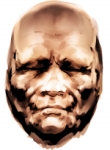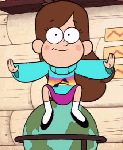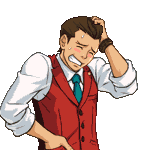Description
The submission period for the contest is now over, but the discussion has just begun!
Forum thread here.
The results are in:
Gold - Azalathemad
Silver - Aegix_Drakan
Bronze - NeverSilent
Congratulations to them and to everyone who took part in the contest!

This isa Community episode a contest and an experiment in game design prompted by Sviel's suggestion among the many thought-provoking comments to that article. If you don't take part in the contest for fun, fame and prizes, do it for SCIENCE.
The individual goal of the contest is to design a RPG battle system and showcase it in one or a few battles, while avoiding the usual clutter of mechanisms that is a staple of the genre, with the help of some guidelines given below.
The collective goal is to search together for the essential principles of the RPG battle - the skeleton of decisions that gives them their flavor and depth.
This is more challenging than a normal contest because it rewards creative and analytical thinking rather than just good craftsmanship. On the other hand, I believe the results could greatly improve the future games produced by the community - both in terms of unexplored strategic potential, and of streamlining battle design to make game-wide balancing (which is one of the worst problems in RPGs) considerably easier.

The three elements listed below are the fundamental aspects of RPG battling. (Explanatory figures and details hidden in spoiler tags.)
They are often obscured by overly complex systems and tons of genre conventions. The purpose of this contest to see what happens when you lay them bare. I am convinced that tons of strategic possibilities have been overlooked so far, simply because they were hard to perceive under the layers of fluff.
1) All RPG systems have a common ground: damage per turn, with the goal of killing before you are killed.
Of course, in this mock-up battle with only Attacks, 1) the hero dies first, and 2) the player is bored to tears. So we must add skills and stuff. (Randomness creates variation that you have no control over, so I won't mention it here).
2) All skills/spells/buffs/items are ways of dealing or receiving that damage faster or slower, more continuously or in bursts. They control the way that damage is concentrated or diluted over time, like pushing and pulling on a rubber band. (The basic, fully stretched state is "spamming attack" as above: not exciting but it gets you there eventually).
Problems:
- the picture above suggests that countless possibilities have never been used (there are many other ways to position and combine these arrows). The most frequent improvement is agility buffs or gaining/losing turns, i.e. ways to do more complicated actions by employing multiple skills at once. But there are lots of other ways to expand on it (see Tips & Inspirations below for ideas).
- usually, healing simply erases some of the enemy's actions in an irrecoverable way. You attack n times, I heal, you attack again, I heal => no net effect, boring. Hence the huge asymmetry in RPG battles: heroes can always heal, most enemies cannot, because there's nothing more infuriating than seeing the enemy heal and erase all your efforts.
It would be more interesting to rethink healing so that the effect of an action was never canceled, but for instance delayed, or spread over X turns, or converted into something else - still there in some form, ready to be reused by future skills.
3) MP, Limit Breaks, status conditions, multiple characters and classes are ways of allowing the player variable access to the skills over time. That's because strategy is not about the winning move, it's about progressively setting up the conditions which allow that move.

Problem: in RPGs you generally have extremely basic (un)locking conditions within the battle:
- "if I have a lot of MP, I can use all my powerful spells"
- "if this character dies/sleeps/is berserk, I lose access to their skills"
- (occasionally) "if I use a weak skill I will be able to use a stronger one next"
I think this is the aspect of RPGs that leaves the largest room for improvement by far. For a battle to have more strategy, every action you take should allow new moves and block other ones, potentially for the rest of the fight. What you can do at any given moment should be the logical product of your past actions and your enemy's, if possible in more evolved ways that a binary question like "out of mana?" or "silenced?".
This all boils down to a simple idea: if you want to encapsulate the feeling of combat, what you need is
- balance of power, represented by any gauge or number (and its evolution in time),
- seizing opportunities, represented by the diversity of available options and how you get or lose access to them.
Everything else is decorative, and there is much more freedom in how you could translate this into a system than what has ever been explored in any game so far.

- Rules with "must" are requirements.
- Rules with "should" can be transgressed at your own risk, if you think your interpretation is more clever than the original rule (feel free to contact me to talk about it).
1) Game:
- The game can be made using any software, but it must contain everything it requires to run on its own.
- You can reuse the Default Battle System in clever ways, use scripts, or make a custom system of any degree of sophistication. You won't be judged on the prettiness of the implementation, only on the strategic depth of the principles beneath.
- The entry can be a single or multiple battles long (but we will judge at most 4 or 5 battles, not 40). It should not contain any cutscene or exploration phase, unless they are entirely skippable.
=> You can make an entire game out of your system, just give the judges a way to play only the 1 to 5 battles you want to showcase.
- There can be as many or as few characters & enemies as you wish. The rules suggested here should make a 1-character 1-enemy duel as complex as a full-scale battle.
2) Skill design:
- The only gauge must be HP. You can work around this rule and make MP/AP/Limit Break equivalents using the rules below, but tons of extra points will be given to contestants who instead try to do something really new.
- There must be no randomness in the effect of an attack or skill. This contest is just an experiment in RPG tactics, so the player should be able to make elaborate plans without computing conditional probabilities in their head.
- Skills should be designed to reflect principle 2) in the Rationale section above as clearly as possible
- For more points, every skill should bring something new to the table. No skill should be "the same but stronger". Each skill should provide a different way of manipulating the repartition of damage over time, that cannot be produced by using other skills.
3) Skill unlocking:
- There must be rules to determine when you can or cannot use a given skill. We are trying here not to default to a simple gauge like MP: expending mana/drinking ethers is a very binary way of implementing actions that (un)lock other actions. Ideally, every action could have:
* multiple effects in unlocking other actions (e.g. a feint opens up various attacks)
* multiple conditions for its own unlocking (e.g. an attack requires the right posture, the right distance, and the right weakness in the enemy's defense)
* multiple ways to fulfill these conditions
- As much as possible, the rules for locking/unlocking should not be special cases (e.g. Fire Sword unlocks Mega-Smash), but more general logical principles. Even better if they apply similarly to the enemies' skills!
- As much as possible, locking/unlocking should be long lasting, i.e. not only dependent on the current state of the characters, but also on past actions both by them and by their enemies.
- You are free to invent the detail of these locking rules, but more points will be given if they are simple and intuitive.
- If you have multiple battles, there can be permanent effects transferred from one battle to the next.

General tips and suggestions:
- Anyone who has trouble with the rules can ask questions in a comment or PM. I can help with things such as checking that skills are not reducible to one another, if you want to do it the mathy way.
- "one goal=one action" is the antithesis of strategy. Every action should serve multiple goals and every goal require multiple actions. Real creativity appears when you start finding ways to control the breadth of actions at your and your enemy's disposal, trapping them into predictable moves while extending your own possibilities.
- you can draw some inspiration from CCGs like Magic the Gathering. They are in fact very close to the concepts exposed here for RPG battles: the "skill unlocking" revolves partly around drawing the cards from your deck, with special effects such as reshuffling the deck or drawing more often. Notice that most CCGs contain effects that allow to bring back cards that have already been used/discarded, which is a way of making even past actions relevant to your current tactical options.
- It could be great to have a visual aid for damage repartition/displacement over turns (perhaps a graph of damage over time, in the spirit of what I did in the Rationale section) or some other way to make the effect of any skill perfectly clear and analyzable by the player.
- A suggestion: skills could displace either the same quantity of damage (e.g. 1HP if you're going the small-numbers route), or all the damage dealt in the target turn(s) (including contributions from other skills). This will make elaborate tactics much easier to figure than having a lot of different quantities or percentages. The less math the player needs to do, the more they can make clever plans.
- How much damage is moved around by a skill should not depend on some intrinsic property of the character or the enemy (e.g. elemental weakness). We want strategies to be effective because of what the enemies have done, not because of what they are (i.e. strategy rather than a puzzle that can be solved once and for all). What will differentiate them is their inventory of skills and how they use them.
- You are allowed to "disguise" to some extent the mechanical aspects detailed above to make the game more appealing or closer in appearance to traditional RPGs, as long as damage-moving and locking rules are clearly stated in-game or in a design document included with the game.
Don't go too fancy though: the goal is to expose the skeleton of RPG battles, not bury it under fluff.
Some random starting ideas:
* Why not boil it down to a single HP bar and have each group try to push it in a different direction? (somewhat like Last Word)
* What if a single attack could kill, and the whole battle is a game of counters and feints to try to get that attack in before the enemy does? (Bushido Blade style)
* What if the "rubber band" of damage is elastic, and tends to come back to its natural state over time (so that both bursts of damage and healing progressively come undone)
* Why not use many more status conditions than usual, each one affecting some fraction of the skills (like Silence prevents Magic, but less generic), or even interacting with each other.
* For instance, why not call status conditions "stances" and use concepts from martial arts or fencing to create the skill unlocking logic? (depending on your distance, your weapon, your stance and the enemy's, you can use ground fighting, feints, throws, locks and so on)
* What if there were more categories than just allies and enemies with which to interact through the skills? (for instance neutral resources in the environment)
* For a simple extension of the DBS, you could have a number of different characters with a system for switching them in battle, then group skills that should be locked or unlocked together by giving them to the same character (or make them combos requiring multiple characters), then add conditions to access/summon that character.
* A limited component of TRPG-like motion is not forbidden (think The Reconstruction), although I'd like to see contestants tread newer ground as well.
* For multiple battles, how about having enemies who have the same brute force as you, but are programmed to have an increasingly broad range of tactical possibilities? Every encounter would actually serve the overall gameplay by teaching you how to deal with them in more and more elaborate settings, instead of being its own beast that loses all purpose once mastered.
Recommendations given in the comments section:

Anyone who wants to help me judge can let me know here or by PM, I will require their help depending on how many submissions we get. I will ask the judges to read this conversation if they haven't already, so as to have an idea of what we are looking for here.
Tentative criteria for judging:
Originality (20pts): How much does the system contribute to pushing the boundaries of the genre?
Example: Can you find ways to expand on the JRPG system that are not just adding one more gauge, or one more way to get a stat bonus?
Elegance (25pts): Is the system using as few ingredients as possible to achieve its goals in a precise way?
Example: Is each skill truly different from the others? Have you found a simpler way to achieve what usually requires 3 gauges, 10 stats and 100 different items?
Clarity (20pts): How well can the player understand the system, its strategic stakes, and the reason their actions succeed or fail?
Example: Are the effects of each action clearly labeled? Does the system avoid having the player do mental calculus to evaluate the result of their actions? Is the skill unlocking logic consistent and predictable?
Depth (25pts): How much does the system allow and reward elaborate plans, creativity and tactical intuition?
Example: Can we predict how our actions will guide the enemies' reactions, allowing us to manipulate them? Is the game more than pure HP/MP/Item attrition?
Bonus (10pts): Anything a judge finds especially worthy of praise.

I don't expect that making the game will take more than a couple of days at most; however for the sake of all people with a busy schedule, the contest will run from July 27 to August 27 23:59 EST. (however I won't mind if people get the time zone wrong)

The top 3 contestants will get to choose one of the following prizes:
(x1) Any game under 20 USD on Steam or the Humble store, because I might as well make it rain, FOR SCIENCE.
(x3) A (reasonable) drawing by yours truly. Preferably characters (fanart or original, any style), possibly simple environment shots or short multipanel gag in sketchy style. You can do whatever you want with it, use it as title screen or make a tattoo or sell it on eBay.
(x1) A cameo in my future game (hey, that works for Kickstarters. NB: I'm not really expecting anyone to pick this, but I'll give details if a winner is actually interested.)
Forum thread here.
The results are in:
Gold - Azalathemad
Silver - Aegix_Drakan
Bronze - NeverSilent
Congratulations to them and to everyone who took part in the contest!

This is
The individual goal of the contest is to design a RPG battle system and showcase it in one or a few battles, while avoiding the usual clutter of mechanisms that is a staple of the genre, with the help of some guidelines given below.
The collective goal is to search together for the essential principles of the RPG battle - the skeleton of decisions that gives them their flavor and depth.
This is more challenging than a normal contest because it rewards creative and analytical thinking rather than just good craftsmanship. On the other hand, I believe the results could greatly improve the future games produced by the community - both in terms of unexplored strategic potential, and of streamlining battle design to make game-wide balancing (which is one of the worst problems in RPGs) considerably easier.

The three elements listed below are the fundamental aspects of RPG battling. (Explanatory figures and details hidden in spoiler tags.)
They are often obscured by overly complex systems and tons of genre conventions. The purpose of this contest to see what happens when you lay them bare. I am convinced that tons of strategic possibilities have been overlooked so far, simply because they were hard to perceive under the layers of fluff.
1) All RPG systems have a common ground: damage per turn, with the goal of killing before you are killed.

Of course, in this mock-up battle with only Attacks, 1) the hero dies first, and 2) the player is bored to tears. So we must add skills and stuff. (Randomness creates variation that you have no control over, so I won't mention it here).
2) All skills/spells/buffs/items are ways of dealing or receiving that damage faster or slower, more continuously or in bursts. They control the way that damage is concentrated or diluted over time, like pushing and pulling on a rubber band. (The basic, fully stretched state is "spamming attack" as above: not exciting but it gets you there eventually).

Problems:
- the picture above suggests that countless possibilities have never been used (there are many other ways to position and combine these arrows). The most frequent improvement is agility buffs or gaining/losing turns, i.e. ways to do more complicated actions by employing multiple skills at once. But there are lots of other ways to expand on it (see Tips & Inspirations below for ideas).
- usually, healing simply erases some of the enemy's actions in an irrecoverable way. You attack n times, I heal, you attack again, I heal => no net effect, boring. Hence the huge asymmetry in RPG battles: heroes can always heal, most enemies cannot, because there's nothing more infuriating than seeing the enemy heal and erase all your efforts.
It would be more interesting to rethink healing so that the effect of an action was never canceled, but for instance delayed, or spread over X turns, or converted into something else - still there in some form, ready to be reused by future skills.
3) MP, Limit Breaks, status conditions, multiple characters and classes are ways of allowing the player variable access to the skills over time. That's because strategy is not about the winning move, it's about progressively setting up the conditions which allow that move.

Problem: in RPGs you generally have extremely basic (un)locking conditions within the battle:
- "if I have a lot of MP, I can use all my powerful spells"
- "if this character dies/sleeps/is berserk, I lose access to their skills"
- (occasionally) "if I use a weak skill I will be able to use a stronger one next"
I think this is the aspect of RPGs that leaves the largest room for improvement by far. For a battle to have more strategy, every action you take should allow new moves and block other ones, potentially for the rest of the fight. What you can do at any given moment should be the logical product of your past actions and your enemy's, if possible in more evolved ways that a binary question like "out of mana?" or "silenced?".
This all boils down to a simple idea: if you want to encapsulate the feeling of combat, what you need is
- balance of power, represented by any gauge or number (and its evolution in time),
- seizing opportunities, represented by the diversity of available options and how you get or lose access to them.
Everything else is decorative, and there is much more freedom in how you could translate this into a system than what has ever been explored in any game so far.

- Rules with "must" are requirements.
- Rules with "should" can be transgressed at your own risk, if you think your interpretation is more clever than the original rule (feel free to contact me to talk about it).
1) Game:
- The game can be made using any software, but it must contain everything it requires to run on its own.
- You can reuse the Default Battle System in clever ways, use scripts, or make a custom system of any degree of sophistication. You won't be judged on the prettiness of the implementation, only on the strategic depth of the principles beneath.
- The entry can be a single or multiple battles long (but we will judge at most 4 or 5 battles, not 40). It should not contain any cutscene or exploration phase, unless they are entirely skippable.
=> You can make an entire game out of your system, just give the judges a way to play only the 1 to 5 battles you want to showcase.
- There can be as many or as few characters & enemies as you wish. The rules suggested here should make a 1-character 1-enemy duel as complex as a full-scale battle.
2) Skill design:
- The only gauge must be HP. You can work around this rule and make MP/AP/Limit Break equivalents using the rules below, but tons of extra points will be given to contestants who instead try to do something really new.
- There must be no randomness in the effect of an attack or skill. This contest is just an experiment in RPG tactics, so the player should be able to make elaborate plans without computing conditional probabilities in their head.
- Skills should be designed to reflect principle 2) in the Rationale section above as clearly as possible
i.e. skills are ways to change the repartition of damage over time. The effect of any skill in those terms should be very clear, to let players compare skills and conceive strategies more easily. For instance, instead of directly dealing damage, skills could change the number of times a character attacks in a turn (it's easier to compare "1 attack" with "3 attacks" than to have to chose between spells that inflict 70HP on one enemy or 10HP/turn for 4 turns on 2 enemies).
- For more points, every skill should bring something new to the table. No skill should be "the same but stronger". Each skill should provide a different way of manipulating the repartition of damage over time, that cannot be produced by using other skills.
3) Skill unlocking:
- There must be rules to determine when you can or cannot use a given skill. We are trying here not to default to a simple gauge like MP: expending mana/drinking ethers is a very binary way of implementing actions that (un)lock other actions. Ideally, every action could have:
* multiple effects in unlocking other actions (e.g. a feint opens up various attacks)
* multiple conditions for its own unlocking (e.g. an attack requires the right posture, the right distance, and the right weakness in the enemy's defense)
* multiple ways to fulfill these conditions
- As much as possible, the rules for locking/unlocking should not be special cases (e.g. Fire Sword unlocks Mega-Smash), but more general logical principles. Even better if they apply similarly to the enemies' skills!
- As much as possible, locking/unlocking should be long lasting, i.e. not only dependent on the current state of the characters, but also on past actions both by them and by their enemies.
Counter-example to these 3 points: Being "out of mana" is a locking effect that
- depends only on your current state (no matter how you reached it or what the enemy has been doing)
- affects all skills at the same time
- has no real trade-off: more mana always equals more good
- and can be canceled with a single action (drinking an Ether).
By contrast, in a typical strategy game, every time you move a piece, you are closing off some possibilities and opening new ones by combination with the positions of all other pieces, so every move along the way can play some role in your victory.
- depends only on your current state (no matter how you reached it or what the enemy has been doing)
- affects all skills at the same time
- has no real trade-off: more mana always equals more good
- and can be canceled with a single action (drinking an Ether).
By contrast, in a typical strategy game, every time you move a piece, you are closing off some possibilities and opening new ones by combination with the positions of all other pieces, so every move along the way can play some role in your victory.
- You are free to invent the detail of these locking rules, but more points will be given if they are simple and intuitive.
Example: in board games, it's simple geometry that creates these rules (a piece/unit contributes to your tactics by blocking a line of sight, or flanking an enemy...). Here you could use some sort of spatial logic as well, or all sorts of different principles (see Tips & Inspirations below for examples).
- If you have multiple battles, there can be permanent effects transferred from one battle to the next.
i.e. "items" are skills following all the rules above, except their locking/unlocking effects are not limited to one battle (e.g. a consumable item simply locks itself permanently once used, but there could be more elaborate patterns).

General tips and suggestions:
- Anyone who has trouble with the rules can ask questions in a comment or PM. I can help with things such as checking that skills are not reducible to one another, if you want to do it the mathy way.
- "one goal=one action" is the antithesis of strategy. Every action should serve multiple goals and every goal require multiple actions. Real creativity appears when you start finding ways to control the breadth of actions at your and your enemy's disposal, trapping them into predictable moves while extending your own possibilities.
- you can draw some inspiration from CCGs like Magic the Gathering. They are in fact very close to the concepts exposed here for RPG battles: the "skill unlocking" revolves partly around drawing the cards from your deck, with special effects such as reshuffling the deck or drawing more often. Notice that most CCGs contain effects that allow to bring back cards that have already been used/discarded, which is a way of making even past actions relevant to your current tactical options.
- It could be great to have a visual aid for damage repartition/displacement over turns (perhaps a graph of damage over time, in the spirit of what I did in the Rationale section) or some other way to make the effect of any skill perfectly clear and analyzable by the player.
- A suggestion: skills could displace either the same quantity of damage (e.g. 1HP if you're going the small-numbers route), or all the damage dealt in the target turn(s) (including contributions from other skills). This will make elaborate tactics much easier to figure than having a lot of different quantities or percentages. The less math the player needs to do, the more they can make clever plans.
- How much damage is moved around by a skill should not depend on some intrinsic property of the character or the enemy (e.g. elemental weakness). We want strategies to be effective because of what the enemies have done, not because of what they are (i.e. strategy rather than a puzzle that can be solved once and for all). What will differentiate them is their inventory of skills and how they use them.
- You are allowed to "disguise" to some extent the mechanical aspects detailed above to make the game more appealing or closer in appearance to traditional RPGs, as long as damage-moving and locking rules are clearly stated in-game or in a design document included with the game.
Don't go too fancy though: the goal is to expose the skeleton of RPG battles, not bury it under fluff.
Some random starting ideas:
* Why not boil it down to a single HP bar and have each group try to push it in a different direction? (somewhat like Last Word)
* What if a single attack could kill, and the whole battle is a game of counters and feints to try to get that attack in before the enemy does? (Bushido Blade style)
* What if the "rubber band" of damage is elastic, and tends to come back to its natural state over time (so that both bursts of damage and healing progressively come undone)
* Why not use many more status conditions than usual, each one affecting some fraction of the skills (like Silence prevents Magic, but less generic), or even interacting with each other.
* For instance, why not call status conditions "stances" and use concepts from martial arts or fencing to create the skill unlocking logic? (depending on your distance, your weapon, your stance and the enemy's, you can use ground fighting, feints, throws, locks and so on)
* What if there were more categories than just allies and enemies with which to interact through the skills? (for instance neutral resources in the environment)
* For a simple extension of the DBS, you could have a number of different characters with a system for switching them in battle, then group skills that should be locked or unlocked together by giving them to the same character (or make them combos requiring multiple characters), then add conditions to access/summon that character.
* A limited component of TRPG-like motion is not forbidden (think The Reconstruction), although I'd like to see contestants tread newer ground as well.
* For multiple battles, how about having enemies who have the same brute force as you, but are programmed to have an increasingly broad range of tactical possibilities? Every encounter would actually serve the overall gameplay by teaching you how to deal with them in more and more elaborate settings, instead of being its own beast that loses all purpose once mastered.
Recommendations given in the comments section:
An episode of Retronauts literally just came out that discusses RPG battle systems.
http://www.retronauts.com/?p=846.
http://www.retronauts.com/?p=846.

Anyone who wants to help me judge can let me know here or by PM, I will require their help depending on how many submissions we get. I will ask the judges to read this conversation if they haven't already, so as to have an idea of what we are looking for here.
Tentative criteria for judging:
Originality (20pts): How much does the system contribute to pushing the boundaries of the genre?
Example: Can you find ways to expand on the JRPG system that are not just adding one more gauge, or one more way to get a stat bonus?
Elegance (25pts): Is the system using as few ingredients as possible to achieve its goals in a precise way?
Example: Is each skill truly different from the others? Have you found a simpler way to achieve what usually requires 3 gauges, 10 stats and 100 different items?
Clarity (20pts): How well can the player understand the system, its strategic stakes, and the reason their actions succeed or fail?
Example: Are the effects of each action clearly labeled? Does the system avoid having the player do mental calculus to evaluate the result of their actions? Is the skill unlocking logic consistent and predictable?
Depth (25pts): How much does the system allow and reward elaborate plans, creativity and tactical intuition?
Example: Can we predict how our actions will guide the enemies' reactions, allowing us to manipulate them? Is the game more than pure HP/MP/Item attrition?
Bonus (10pts): Anything a judge finds especially worthy of praise.

I don't expect that making the game will take more than a couple of days at most; however for the sake of all people with a busy schedule, the contest will run from July 27 to August 27 23:59 EST. (however I won't mind if people get the time zone wrong)

The top 3 contestants will get to choose one of the following prizes:
(x1) Any game under 20 USD on Steam or the Humble store, because I might as well make it rain, FOR SCIENCE.
(x3) A (reasonable) drawing by yours truly. Preferably characters (fanart or original, any style), possibly simple environment shots or short multipanel gag in sketchy style. You can do whatever you want with it, use it as title screen or make a tattoo or sell it on eBay.
(x1) A cameo in my future game (hey, that works for Kickstarters. NB: I'm not really expecting anyone to pick this, but I'll give details if a winner is actually interested.)
Registration
You must be logged in to sign up for Fundamental RPGology.
| Teams | Members | Entry |
|---|---|---|
|
Complexity =/= Strategy
|
||
|
All statements below and above this one just make this one look better. :D
|
||
|
Bludgeon of Inspiration
|
||
|
Brotherhood of Evil Statements
|
||
|
I'm below those above me.
|
||
|
If Karin finds out, I'm screwed.
|
||
|
Why did the statement game ended?
|
||
|
+10 to all enemy stats.
|
|
|
|
At least I'll get something out of this summer.
|
|
|
|
Ayane Fanclub
|
|
|
|
Be Like Water My Friend
|
|
|
|
Can't hardly Science
|
|
|
|
Fighting to the death with Seiromem!
|
|
|
|
Gourdy might not be lazy?
|
|
|
|
I'll release my limit break on all of you!
|
|
|
|
If kentona or soulkeeper finds out, I'd be all "whatever."
|
|
|
|
If soulkeeper finds out, I'm confused.
|
|
|
|
Im not crazy... My mother had me tested!
|
|
|
|
Kentona still owes me a date.
|
|
|
|
LET'S. DO. THIS???
|
|
|
|
Life is Turn-Based.
|
|
|
|
Oh yes, there will be blood...
|
|
|
|
PetzlaProductions
|
|
|
|
Simply complicated ;_;
|
|
|
|
The above statement broke the chain.
|
|
|
|
The above statement is true if this statement is false.
|
|
|
|
The below statement is false
|
|
|
|
THESE ARE COMBATS THAT MATTER!
|
|
|
|
This statement may have a disclaimer.
|
|
|
|
TungerManU
|
|
|
|
You're fighting with borrowed power.
|
|













